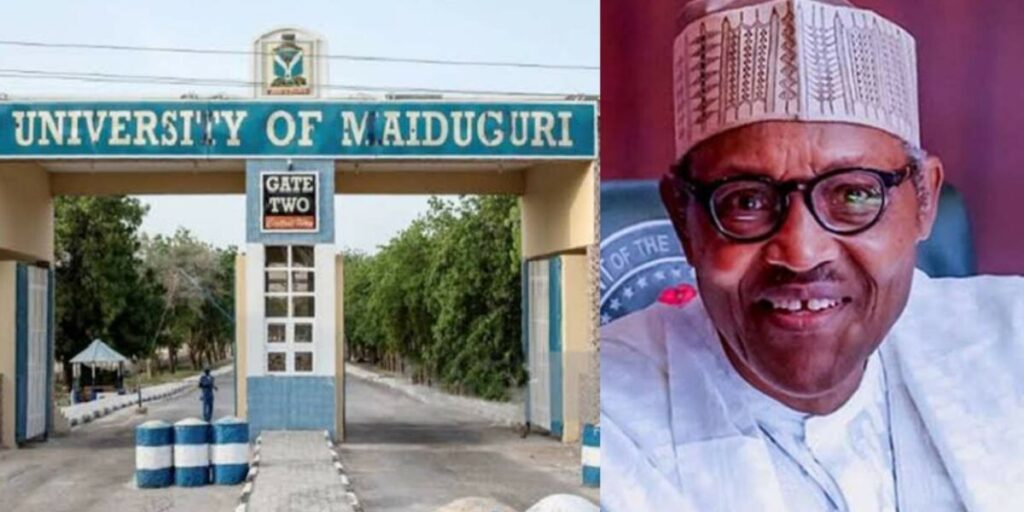In a move steeped in tradition and political symbolism, President Bola Tinubu has announced that the University of Maiduguri (UNIMAID) will be renamed in honor of the late former President Muhammadu Buhari. The decision, intended as a tribute to a leader who dedicated much of his presidency to fighting insurgency in the Northeast, has instead ignited a profound national conversation. This is not merely about changing a name on a sign; it is about the very nature of memory, the weight of a presidential legacy, and the identity of one of Nigeria’s most resilient academic institutions.
The Standard Script of Honor
The practice of renaming national monuments and institutions after departed leaders is a well-worn path in Nigerian politics. It is seen as the ultimate honor, a way to carve a name into the bedrock of the nation’s history. From airports to stadiums, the names of past leaders adorn our public spaces, serving as constant reminders of their time in power. In this context, President Tinubu’s decision is understandable. He is following a familiar script, paying homage to his predecessor in a manner that is both grand and permanent. For supporters of the late president, renaming the foremost university in the Northeast—a region at the heart of Buhari’s security challenges—is a fitting tribute to his commitment and service.
A Legacy Divided, a Name Questioned
However, this act cannot be viewed in a vacuum. It arrives at a moment when Nigeria is still grappling with the complex and often divisive legacy of the Buhari administration. While his admirers praise his personal integrity and his determined fight against corruption, millions of other Nigerians remember his tenure as a period of profound economic hardship, escalating insecurity, and a shrinking space for civic dissent. The memory of the EndSARS protests and the government’s heavy-handed response remains a painful wound for an entire generation.
To bestow his name upon a university—a place of critical thought, open debate, and youthful aspiration—is to force these conflicting narratives into a single, official identity. An institution of learning should be a unifying space, but tying it to a political legacy as polarizing as Buhari’s risks turning it into a symbol of division. Can a student who felt marginalized or unheard during his presidency now walk proudly through the gates of Muhammadu Buhari University?
“Renaming a university after a president is a powerful way to honor their legacy, but we must ask if the identity of the institution should be sacrificed for the memory of an individual, no matter how great.” — A Nigerian academic

UNIMAID’s Own Enduring Legacy
This brings us to the heart of the matter: the identity of the University of Maiduguri itself. UNIMAID is not a blank slate waiting for a new name. For decades, it has stood as a beacon of knowledge and resilience in a region ravaged by conflict. While bombs fell and fear spread, its lecturers continued to teach and its students continued to learn. It became a symbol of defiance against the forces of ignorance and violence. Its name, UNIMAID, carries with it a story of survival, courage, and an unbreakable commitment to education against all odds. To erase that name is to diminish that unique and hard-won identity.
The university’s own legacy is one of quiet strength. It has produced generations of leaders, thinkers, and professionals who have contributed to the development of the Northeast and the nation as a whole. Its alumni do not say they are graduates of a president’s university; they are proud products of UNIMAID. This name change, however well-intentioned, risks overwriting a story of institutional resilience with the story of a single political figure.
Alternatives to Renaming
This is not to say that Muhammadu Buhari should not be honored. There are many ways to pay tribute to a former leader.
- Libraries can be named after him.
- Research centers can be established in his honor.
- Foundations can be created in his name to support education or fight corruption.
These are tributes that add to the nation’s heritage without subtracting from it. Renaming an existing institution, particularly a university with its own rich history, feels less like an honor and more like an imposition.
What Do We Truly Value?
Ultimately, this decision forces us to ask what we truly value. Do we value the memory of powerful men more than the identity of enduring institutions? Is our history best told through the names of our leaders, or through the stories of the communities and organizations that shape our society?
President Tinubu’s gesture is a product of a political culture that often prioritizes personal legacies over institutional ones. But as Nigeria continues to evolve, perhaps it is time to rethink this tradition. A nation’s greatness is not measured by how many monuments it names after its leaders, but by the strength and independence of its institutions.
The University of Maiduguri has earned its name and its place in Nigerian history through decades of service and sacrifice. It deserves to keep it. Honoring Muhammadu Buhari is important, but it should not come at the cost of erasing a powerful legacy that belongs to the people of the Northeast and, indeed, all of Nigeria.
Conclusion: A Legacy in Question
Muhammadu Buhari has been laid to rest, but his legacy continues to be shaped by the actions of those who follow him. President Tinubu’s decision to rename UNIMAID in his honor, while perhaps traditional, carries significant implications. It forces Nigeria to confront difficult questions about how it remembers its past, how it honors its leaders, and how it defines the identity of its vital institutions.
As the debate rages, it is clear that for many, the University of Maiduguri’s existing name carries a powerful legacy of its own—one of resilience, scholarship, and defiance in the face of adversity—a legacy that should not be so easily erased.
Stay woke. Stay tuned. Stay with AKEWE NEWS.